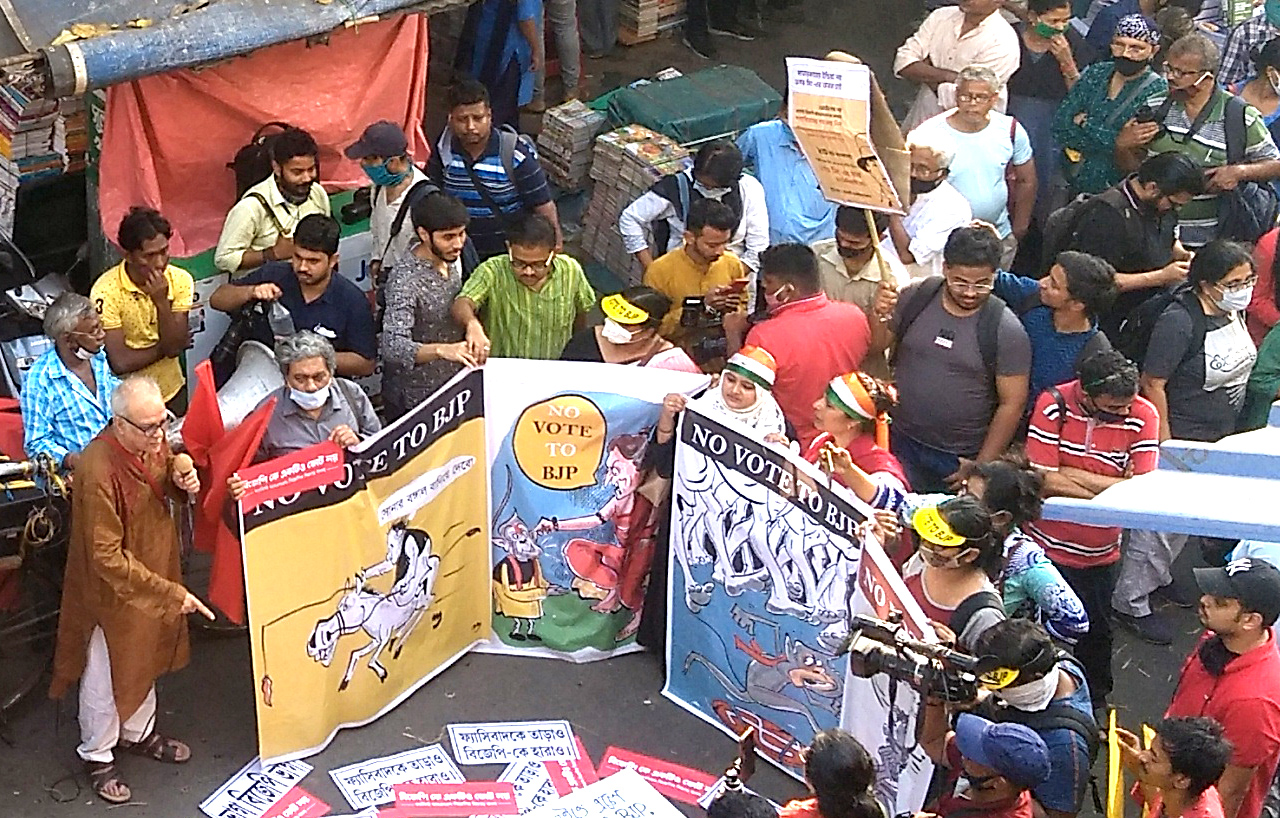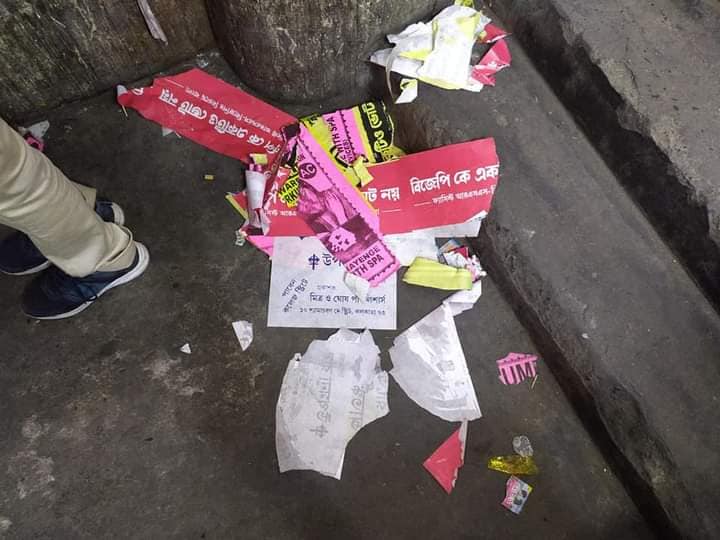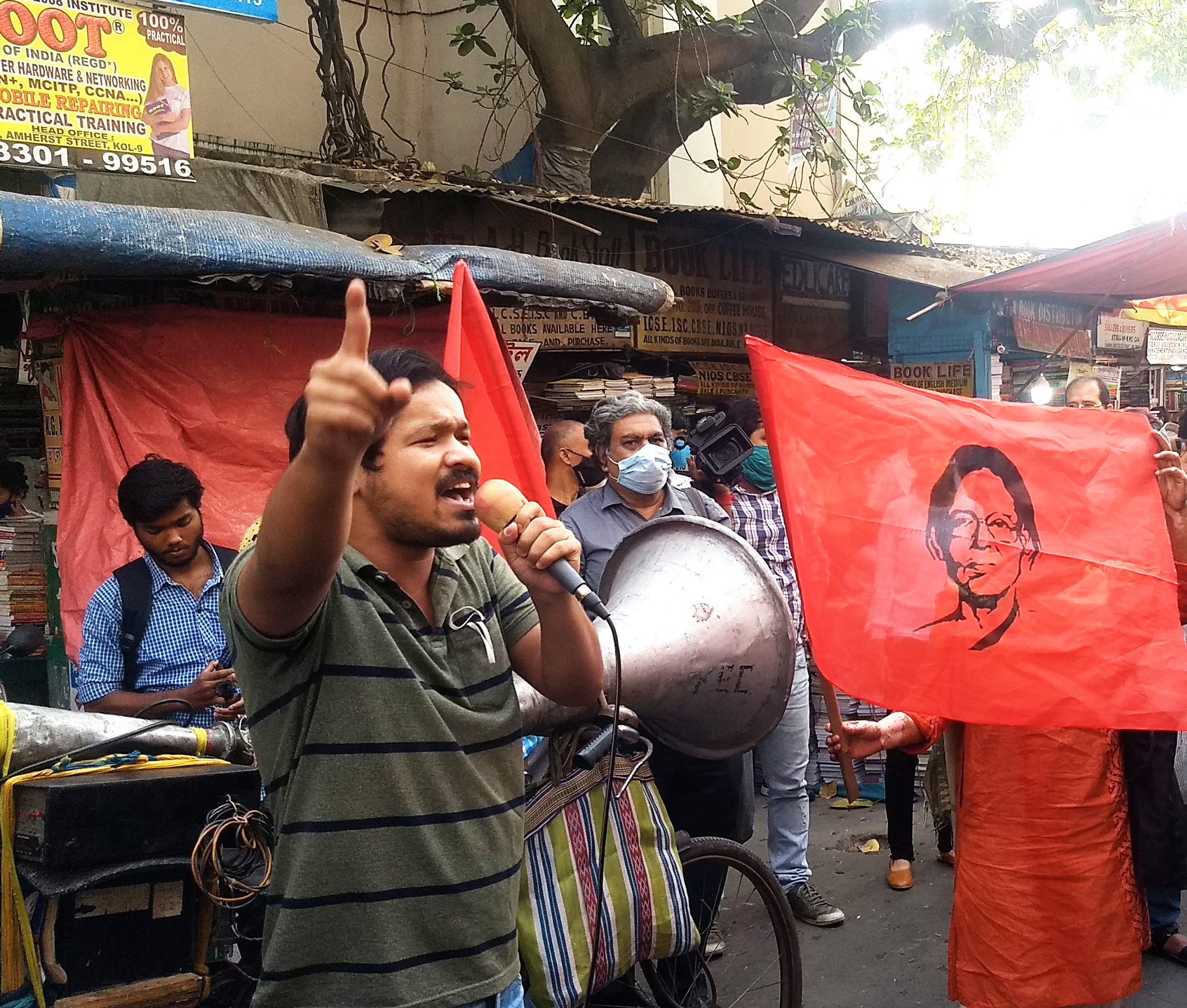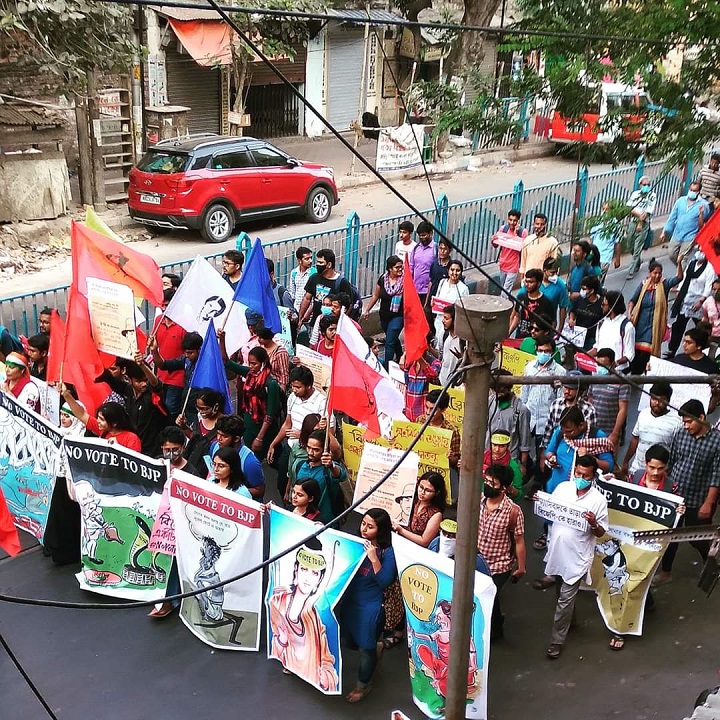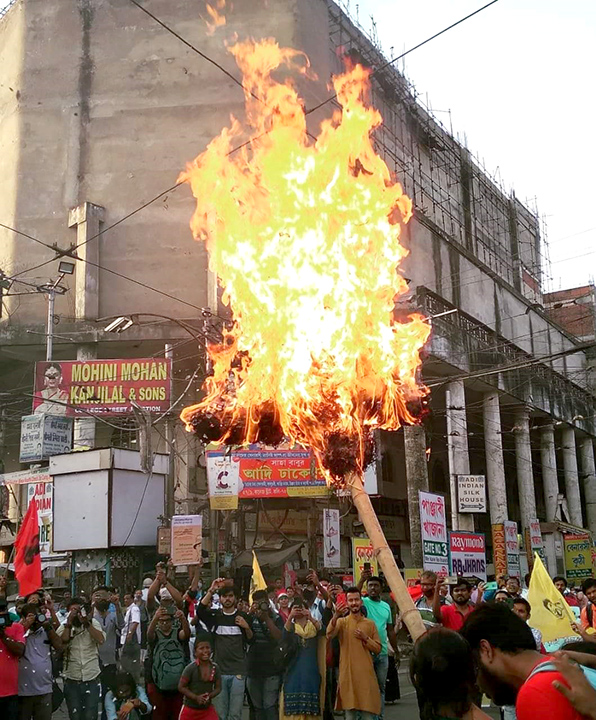Hundreds of people including students, youths, human rights and cultural activists gathered in front of the Coffee House in Kolkata to protest the hooliganism and threat by members of the saffron brigade. A GroundXero report.
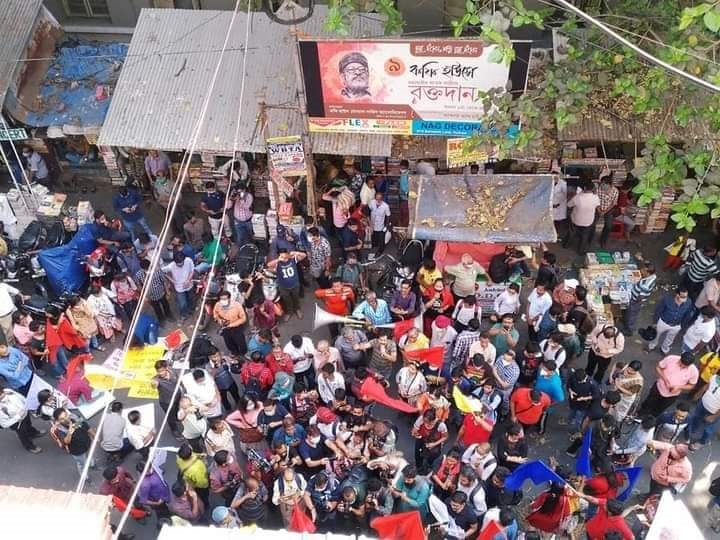
People gather in front of the coffee house to protest hooliganism by a saffron outfit there, the previous day.
On March 15th, 2021, around 4 pm in the afternoon, the Indian Coffee House at College Street in Kolkata witnessed an unlikely congregation. Around 30-40 men, clad in saffron t-shirts, with the inscription of the PM Narendra Modi, printed prominently on the front, showed up in the coffee house. Eye witnesses say, their body language was aggressive, one of affront, and while a group of them, took up tables in the first floor hall of the coffee house, trying to have conversations with people present, others tore the “No Vote to BJP” posters, blackened the word “no” on the walls of the staircase leading to the coffee house. They raised the ‘Jai Shree Ram’ slogan in the hall, abused and threatened the staff and others when asked to stop this hooliganism. Two female student activists present at that time challenged them. They shouted back anti-fascist slogans, that have become popular in Bengal ever since the anti-NRC movement – “Tomar buke Nathuram/Amar buke Kshudiram” (In your heart is Nathuram/In my heart is Kshudiram) – as against the “Jai Shri Ram” chant of the saffron goons, who left soon after.
Pretty soon, social media posts documenting the incident began to be circulated. A protest rally was called on March 16th, 2021, in front of the coffee house. Open call asking people to come and re-install the defaced posters was given on social media. Meanwhile, it became clear, from the social media posts of RSS and ABVP supporters, that the Coffee House attack was indeed, a well-planned event. Indeed, as it got to be known from his social media posts and tweets, the Coffee House event was led by Tajinder Singh Bagga, who had, earlier, in 2011, led the attack on Prashant Bhushan in Delhi. The presence of Bagga, thus, points to the fact that in the context of the impending polls in West Bengal, the BJP-RSS combine, has not only mobilized people from outside the state, but is prioritizing capture of political power and enforcing its hegemony in Bengal in a way that is quite unprecedented in the state’s history.
इंडियन काफी हाउस कोलकाता जिसे कम्युनिस्ट हब कहा जाता है में "नो वोट 2 बीजेपी" के पोस्टर लगे थे, जब टीम मोदी पारा के कार्यकर्ता अपने पोस्टर लगाने लगे तो वामपंथियो ने हल्ला शुरू कर दिया । उसके बाद क्या हुआ आपके सामने है@narendramodi @JPNadda @AmitShah @blsanthosh @KailashOnline pic.twitter.com/AdjPrWyPMb
— Tajinder Pal Singh Bagga (@TajinderBagga) March 15, 2021
It is also noteworthy that the BJP supporters came to the Coffee House, dressed in saffron. The saffron t-shirts with Modi’s image inscribed on its front, singled them out from any other Coffee House attendees, marked their politics, but also gave their bodies an essence of being wrapped up in uniforms. Dressed in the same saffron t-shirt, the men looked more like a regimented army on a mission, rather than casual coffee drinkers. Indeed, in this raid and hooliganism, the idea of a vigilante group, the idea of a non-state fascist army was performed and a chilling message was sent to the left-democratic-liberal sections of the society that they have arrived in Bengal.
The attack on College Street Coffee House was a symbolic act. A symbolic act through which the Hindutva fascist forces threatened to capture spaces in Bengal that has not historically belonged to them. Furthermore, although the social interactions in Coffee House occur necessarily over coffee and food, Coffee House is hardly a space like any other eatery. Instead, it is associated in the Bengali cultural psyche and society as a space that is necessarily tied up with histories of artistic, social and political rebellion. A space that is inextricably tied up with the left-liberal and alternative, counter-cultural histories of Bengal. An attack on the Coffee House, thus, tantamount to an attack on that secular and pluralistic social space. This is notwithstanding the fact that Coffee House is situated in College Street, the area that is intimately associated with the histories of Bengal Renaissance and formation of left-liberal traditions in Bengal. This is also what is known in common parlance as the “boipara” (neighbourhood of books), with almost all of the major publishers in Bengal, having an office or an outlet in the area.
As we have seen in the recent past, fascists often launch their ideologies through spatial politics, through the transformation of a community’s relationship of space. This is evident both in the abrogation of Articles 370 and 35A in Kashmir, and the NRC-NPR-CAA formulations. The attack on College Street Coffee House needs to be seen in that larger context, where alternative spaces become crucial sites of struggle.
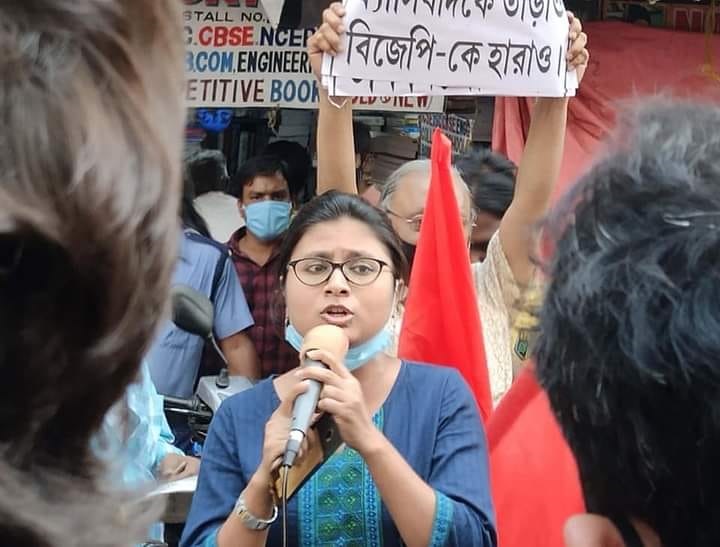
Madhurima, a woman activist, who challenged the saffron hooligans the previous day, addressing the protest gathering.
Significantly, then, the protest meeting, took up that challenge, and announced that no space is going to be yielded to the fascists with resistance. The protest meeting attended by hundreds included known human rights, cultural, public health and political activists of the city, who came from a wide spectrum of left-democratic opinions. Student and youth activists performed well-known Bengali protest songs, chanted slogans and emphasized on the need to build up anti-fascist resistance struggles. While the protest was going on, another group of student and youth activists, kept making new posters with anti-fascist slogans and putting them up on the Coffee House walls, since it was precisely the “No Vote to BJP” posters that were under attack. Numerous speakers spoke about the fact that while the anti-fascist movement would contain people and groups belonging to a wide spectrum of left and democratic philosophies, this is the time when one needs to unite keeping a bird’s eye view on the threat of fascism, and not to harp on the ideological differences amongst the left and the democratic forces.
It was also emphasized that the attack was a reaction of the BJP rattled by the visibility that the “No Vote to BJP” campaign has attained and the wide acceptance of the slogan by the general masses and their active mobilization under it in the state. Afterwards, a rally marched through the neighbouring area. Slogans such as “Boipara ke Modipara hote dicchi na, debo na” (We will not allow book-para to be transformed into Modi-para), “Pritalar Ei Banglay Fascist BJP-r thai nai” (There is no place for fascist BJP in Pritilata’s Bengal), were raised. The rally ended with the burning of an effigy of the Prime Minister Narendra Modi.

